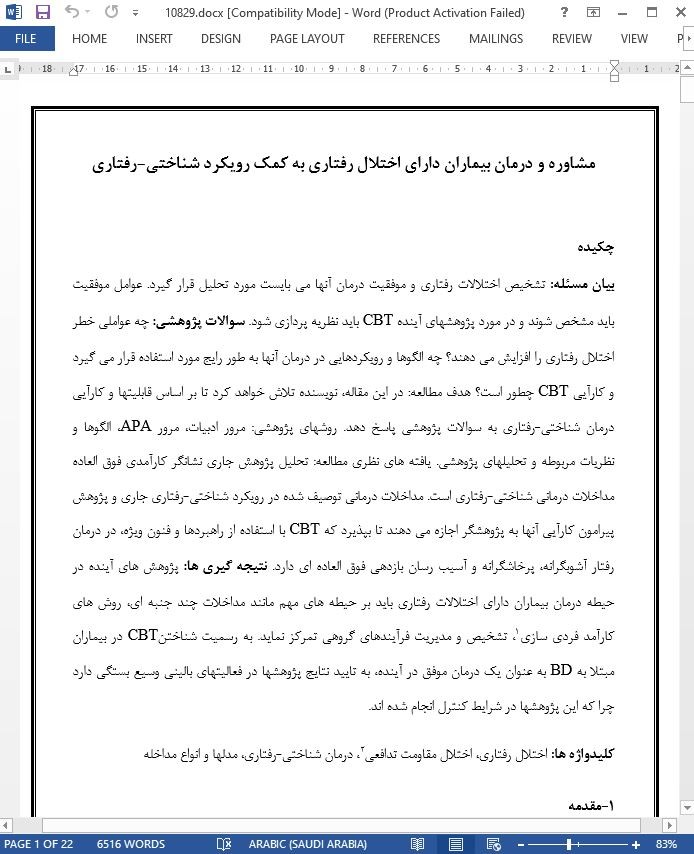
مشاوره و درمان بیماران دارای اختلال رفتاری به کمک رویکرد شناختی-رفتاری
چکیده
بیان مسئله: تشخیص اختلالات رفتاری و موفقیت درمان آنها می بایست مورد تحلیل قرار گیرد. عوامل موفقیت باید مشخص شوند و در مورد پژوهشهای آینده CBT باید نظریه پردازی شود. سوالات پژوهشی: چه عواملی خطر اختلال رفتاری را افزایش می دهند؟ چه الگوها و رویکردهایی در درمان آنها به طور رایج مورد استفاده قرار می گیرد و کارآیی CBT چطور است؟ هدف مطالعه: در این مقاله، نویسنده تلاش خواهد کرد تا بر اساس قابلیتها و کارآیی درمان شناختی-رفتاری به سوالات پژوهشی پاسخ دهد. روشهای پژوهشی: مرور ادبیات، مرور APA، الگوها و نظریات مربوطه و تحلیلهای پژوهشی. یافته های نظری مطالعه: تحلیل پژوهش جاری نشانگر کارآمدی فوق العاده مداخلات درمانی شناختی-رفتاری است. مداخلات درمانی توصیف شده در رویکرد شناختی-رفتاری جاری و پژوهش پیرامون کارآیی آنها به پژوهشگر اجازه می دهند تا بپذیرد که CBT با استفاده از راهبردها و فنون ویژه، در درمان رفتار آشوبگرانه، پرخاشگرانه و آسیب رسان بازدهی فوق العاده ای دارد. نتیجه گیری ها: پژوهش های آینده در حیطه درمان بیماران دارای اختلالات رفتاری باید بر حیطه های مهم مانند مداخلات چند جنبه ای، روش های کارآمد فردی سازی ، تشخیص و مدیریت فرآیندهای گروهی تمرکز نماید. به رسمیت شناختنCBT در بیماران مبتلا به BD به عنوان یک درمان موفق در آینده، به تایید نتایج پژوهشها در فعالیتهای بالینی وسیع بستگی دارد چرا که این پژوهشها در شرایط کنترل انجام شده اند.
1-مقدمه
امروز، مسئله رفتار مخرب، آشوبگرانه، تدافعی و ضد اجتماعی در میان کودکان و نوجوانان مورد علاقه روز افزون پژوهشگران و دانشمندان حوزه های مختلف پژوهشی است. علاوه بر این، تشخیص شخصیت بیمار دارای اختلال رفتاری، در کنار برنامه های پیشگیری و درمانی مورد علاقه خاص بوده است. پژوهشگران به طور خاص بر ویژگیهای افراد مبتلا به اختلال رفتاری، محیط زندگی آنها، نشانه های تشخیصی و علل و پیامدهای اختلال رفتاری که در سطوح مختلف و با شدت متغیر رخ می دهند، تمرکز کرده اند. رفتارهای ضد اجتماعی، پرخاشگرانه و انواع رفتارهای دیگر از این نوع به اختلالاتی که در آنها بدکارکردی در طولانی مدت پایدار است و فقدان مداخله درمانی آنها می تواند پیامدهای منفی قابل توجهی در سطح زندگی فردی، خانوادگی و اجتماعی داشته باشد.
نتیجه گیری
با ملاحظه بحث فوق، ممکن است گفته شود که اختلالات رفتاری(CD و ODD) مشکلات بالینی پیچیده ای هستند که عملکرد افراد را در محیطهای گوناگون زندگی تحت تاثیر قرار می دهد. این اختلالات ممکن ایت ناشی از عوامل خطر ساز جمعی مانند، عوامل بیولوژیک، روانشناختی و اجتماعی که اشکال رفتار گوناگونی به خود می گیرند و باعث مشکلات گوناگون در یک پدیده هیجانی و شناختی می شود. علاوه بر این، آنها بسته به شدت نشانه های ظاهر شده و شاخصهای تشخیصی می توانند متفاوت باشند.
Abstract
Problem statement: The diagnosis of behavioural disorders and their treatment's success needs to be analyzed. The factors of its success should be specified and the future of CBT hypothesized. Research questions: What are the factors that increase the risk of behavioural disorder? What are the models and approaches currently used in their treatment and what is the effectiveness of CBT? Purpose of study: In the paper author will attempt to find answers to the research questions in terms of capabilities and effectiveness of cognitive-behavioural therapy. Research methods: Literature review, including APA, models and theories, research analysis. Theoretical study findings: Current Research analysis shows high effectiveness of cognitive-behavioural therapeutic interventions. Described therapeutic interventions in mainstream cognitive-behavioural, and research on their effectiveness allowed the researcher to assume that CBT has a high efficiency in the treatment of destructive, aggressive and rebellious behaviour by using cognitive-behavioural techniques and strategies. Conclusions Future research on the treatment of patients with behavioural disorders should focus on important areas such as multi-component interventions, effective methods of individualization, identification and management of group processes. Considering CBT of patients with BD, as a successful one in a future, depends on whether the research results under controlled conditions will confirm it in a wide clinical practice.
1. Introduction
Nowadays, the issue of antisocial, oppositional, rebellious and destructive behaviour among children and adolescents is of increasing interest of researchers and scientists from different research areas. Thus, diagnosis of the personality of the patient diagnosed behavioural disorder, along with prevention and intervention programs have ben of particular interest. The researches have focused particularly on the characteristics of individuals with behavioural disorder, their environment, diagnostic symptoms, and causes and consequences of conduct disorders occurring at different levels with varying severity. Antisocial, aggressive, and other types of behaviour are related to disorders in which dysfunction persists the longest hence, the lack of therapeutic intervention can have considerable negative consequences at personal, family and social life levels.
Conclusion
Consideration the discussion above, it is possible to state that behavioural disorders (CD and ODD) are complex clinical problems that affect the functioning of individuals in various spheres of their lives. These disorders may be caused by more cumulative risks factors such as biological, psychological and social, which may take various behavioural forms, and entail problems of various cognitive and emotional character. Additionally, they can be different, depending on the severity of the presented symptoms and diagnostic indicators.

چکیده
1-مقدمه
1.1 اختلال رفتاری و اختلال مقاومت تدافعی:تعریف و ملاکهای تشخیصی
1-2. الگوهای درمان شناختی-رفتاری
1.3- انواع مداخلات شناختی-رفتاری
1.4. ویژگیهای درمان شناختی-رفتاری اختلالات رفتاری
نتیجه گیری
Abstract
1. Introduction
1.1. Behavioural disorder and oppositional defiant disorder: definition and diagnostic criteria
1.2. Models of cognitive-behavioural therapy
1.3. Types of cognitive-behavioural intervention
1.4. Characteristics of cognitive-behavioural therapy of behavioural disorders
Conclusion
- اصل مقاله انگلیسی با فرمت ورد (word) با قابلیت ویرایش
- ترجمه فارسی مقاله با فرمت ورد (word) با قابلیت ویرایش، بدون آرم سایت ای ترجمه
- ترجمه فارسی مقاله با فرمت pdf، بدون آرم سایت ای ترجمه
